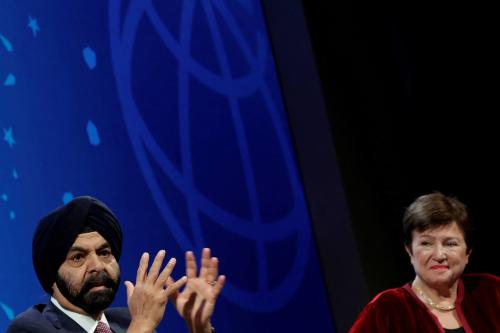The International Monetary Fund and the World Bank are holding their annual meetings in Washington starting October 20. Created at the end of World War II as the institutional guardians of global growth and stability, the Fund and the Bank have served the world well for more than 50 years, but they are in now turmoil. Few Americans realize that the United States, the principal architect of these institutions, is the major source of the turmoil.
The Bush Administration will not be able to fix the problems in the months that remain. Helping these institutions adapt to the political realities of the 21st century, therefore, should be a high priority for the next president. Meeting the challenge successfully will be easier if U.S. policy toward the IMF and World Bank becomes a visible issue in the election campaign. It will also be easier if a bipartisan view emerges on the next steps to take.
The turmoil at the World Bank has been front-page news this year. The resignation of Paul Wolfowitz exposed two glaring problems. One is the practice since the founding of the Bank of letting the President of the United States select the President of the World Bank. This was a sensible practice in the post-WWII and Cold War decades, but has become an intolerable anachronism that weakens the Bank institutionally and works against U.S. long-term interests.
The other problem is the mission of the Bank and its operating methods. The Bank is addressing too many issues with a set of tools that is too limited and too old. It is trying to turn a screw with a hammer. Moreover, the handle on the hammer is much too long and too many experts are holding it. The Bank would be more effective if it operated more closely to the people it is trying to help, acted more opportunistically, and used tools that are more like scalpels than hammers.
The less visible turmoil at the IMF is fundamentally harder for the American public to understand even though it reflects similar problems. A Spaniard is being replaced by a Frenchman as head (Managing Director) of the IMF at the end of October. Here the practice from the beginning has been for the Europeans to select the Managing Director. The developing country members of the IMF, however, have become increasingly dissatisfied with this practice to the point where the legitimacy of the IMF has been called into question.
This leadership problem is compounded by a burning controversy about the IMF’s weighted voting system and the composition of its resident board of Executive Directors. The allocation of votes discriminates in favor of slow-growing high-income industrial countries against the fast-growing middle-income emerging market countries like China and India and Brazil. In the Executive Board, the European countries hold a disproportionate share of the seats for historical reasons and have resisted proposals to trim back their representation.
Alongside the legitimacy problem is a festering “relevance” problem. The demand for financing from the IMF dropped sharply in 2003 and the Fund has yet to find a new niche in the hugely dynamic and liquid international financial system now dominated by flows of private capital.
A daunting political hurdle for both institutions is that the average American has no concept of their fundamentally different roles because they have become so intertwined over the past sixty years. The fact that their headquarters are on facing blocks in Washington, DC, compounds the confusion and has prompted serious proposals to merge them or close one of them down. Either move would represent a great loss for the United States. Restructured to be effective guardians of growth and stability for the next 60 years, they represent part of the multilateral framework required to ensure the future security and prosperity of America.
Here then are some of the big issues that deserve to be debated in the run-up to the election of the next American president in November 2008:
- How can the heads of the IMF and World Bank be selected to enhance the legitimacy of both institutions without weakening US support for them?
- To ensure that IMF and World Bank operations are consistent with U.S. objectives, is it necessary for the United States to continue being the only member with a veto power over basic decisions such as amending their charters or increasing their capital?
- How can the missions of the two institutions be recast to make them more distinct, more effective, and more valued by the American public?
- Is it necessary, in terms of U.S. interests, that the headquarters of both institutions remain in Washington, DC, or would it be better for the World Bank to move to a country like Spain?
If the next American president comes into office with some degree of bipartisan consensus about fixing the IMF and the World Bank, there is a bright future for these institutions. Otherwise they are likely to drift further into disfavor and irrelevance.



Commentary
Op-edWhy the Next President Should Care About the World Bank and the IMF
October 19, 2007